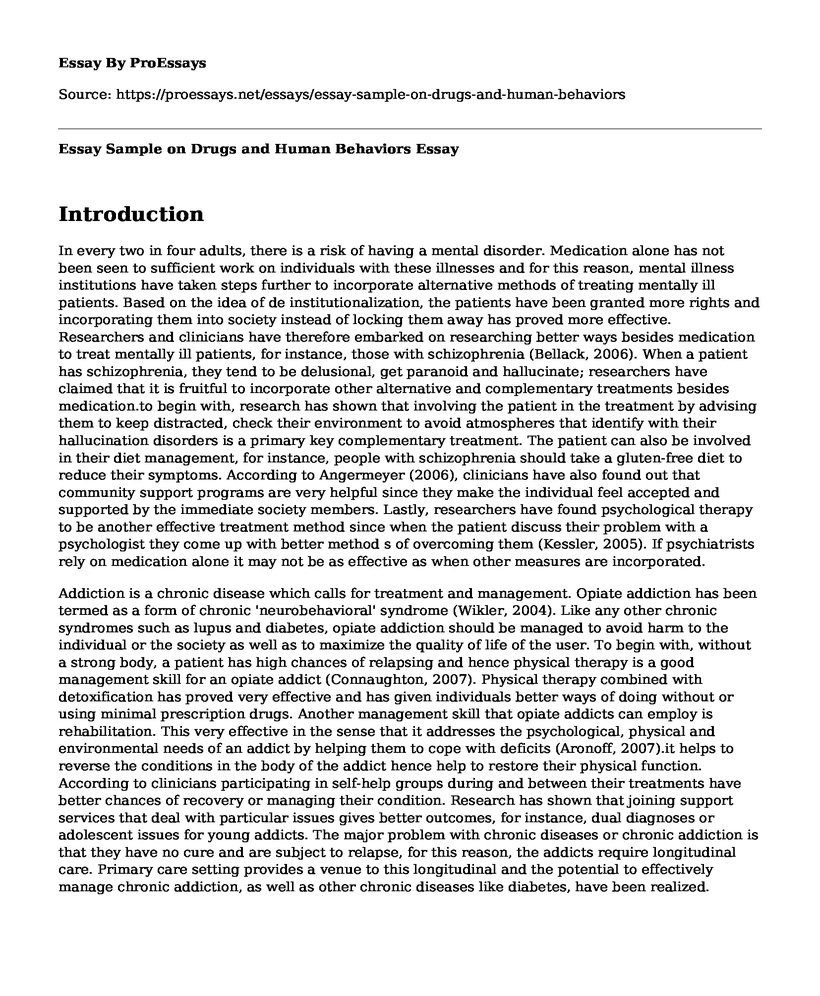Introduction
In every two in four adults, there is a risk of having a mental disorder. Medication alone has not been seen to sufficient work on individuals with these illnesses and for this reason, mental illness institutions have taken steps further to incorporate alternative methods of treating mentally ill patients. Based on the idea of de institutionalization, the patients have been granted more rights and incorporating them into society instead of locking them away has proved more effective. Researchers and clinicians have therefore embarked on researching better ways besides medication to treat mentally ill patients, for instance, those with schizophrenia (Bellack, 2006). When a patient has schizophrenia, they tend to be delusional, get paranoid and hallucinate; researchers have claimed that it is fruitful to incorporate other alternative and complementary treatments besides medication.to begin with, research has shown that involving the patient in the treatment by advising them to keep distracted, check their environment to avoid atmospheres that identify with their hallucination disorders is a primary key complementary treatment. The patient can also be involved in their diet management, for instance, people with schizophrenia should take a gluten-free diet to reduce their symptoms. According to Angermeyer (2006), clinicians have also found out that community support programs are very helpful since they make the individual feel accepted and supported by the immediate society members. Lastly, researchers have found psychological therapy to be another effective treatment method since when the patient discuss their problem with a psychologist they come up with better method s of overcoming them (Kessler, 2005). If psychiatrists rely on medication alone it may not be as effective as when other measures are incorporated.
Addiction is a chronic disease which calls for treatment and management. Opiate addiction has been termed as a form of chronic 'neurobehavioral' syndrome (Wikler, 2004). Like any other chronic syndromes such as lupus and diabetes, opiate addiction should be managed to avoid harm to the individual or the society as well as to maximize the quality of life of the user. To begin with, without a strong body, a patient has high chances of relapsing and hence physical therapy is a good management skill for an opiate addict (Connaughton, 2007). Physical therapy combined with detoxification has proved very effective and has given individuals better ways of doing without or using minimal prescription drugs. Another management skill that opiate addicts can employ is rehabilitation. This very effective in the sense that it addresses the psychological, physical and environmental needs of an addict by helping them to cope with deficits (Aronoff, 2007).it helps to reverse the conditions in the body of the addict hence help to restore their physical function. According to clinicians participating in self-help groups during and between their treatments have better chances of recovery or managing their condition. Research has shown that joining support services that deal with particular issues gives better outcomes, for instance, dual diagnoses or adolescent issues for young addicts. The major problem with chronic diseases or chronic addiction is that they have no cure and are subject to relapse, for this reason, the addicts require longitudinal care. Primary care setting provides a venue to this longitudinal and the potential to effectively manage chronic addiction, as well as other chronic diseases like diabetes, have been realized.
References
Angermeyer, M. C., Cooper, B., & Link, B. G. (2006). Mental disorder and violence: results of epidemiological studies in the era of de-institutionalization. Social Psychiatry and Psychiatric Epidemiology.
Aronoff, G. M. (2000). Opioids in chronic pain management: is there a significant risk of addiction?.A Current review of pain.
Bellack, A. S., & Mueser, K. T. (2006). A comprehensive treatment program for schizophrenia and chronic mental illness. Community Mental Health Journal.
Connaughton, J. F., Reeser, D., Schut, J., & Finnegan, L. P. (2007). Perinatal addiction: outcome and management. American journal of obstetrics and gynecology.
Kessler, R. C., Demler, O., Frank, R. G., Olfson, M., Pincus, H. A., Walters, E. E., ... & Zaslavsky, A. M. (2005). Prevalence and treatment of mental disorders, 1990 to 2003. New England Journal of Medicine.
Wikler, A. (2004). Conditioning factors in opiate addiction and relapse. Journal of Substance Abuse Treatment.
Cite this page
Essay Sample on Drugs and Human Behaviors. (2022, Dec 14). Retrieved from https://proessays.net/essays/essay-sample-on-drugs-and-human-behaviors
If you are the original author of this essay and no longer wish to have it published on the ProEssays website, please click below to request its removal:
- Trump's Immigration Policies Essay
- Paper Example on Organizational and Individual Stress Coping Strategies
- Expository Essay: The Elderly
- Essay Sample on How Political Climate Today Impacted My Thoughts on Immigration
- Assignment Example on Poverty as Either a Structural or Individual Problem
- Paper Example on Black Lives Matter: 150 Yrs of Struggle for Justice
- Paper Sample on Racism in Advertising: A Global Challenge Affecting Business







